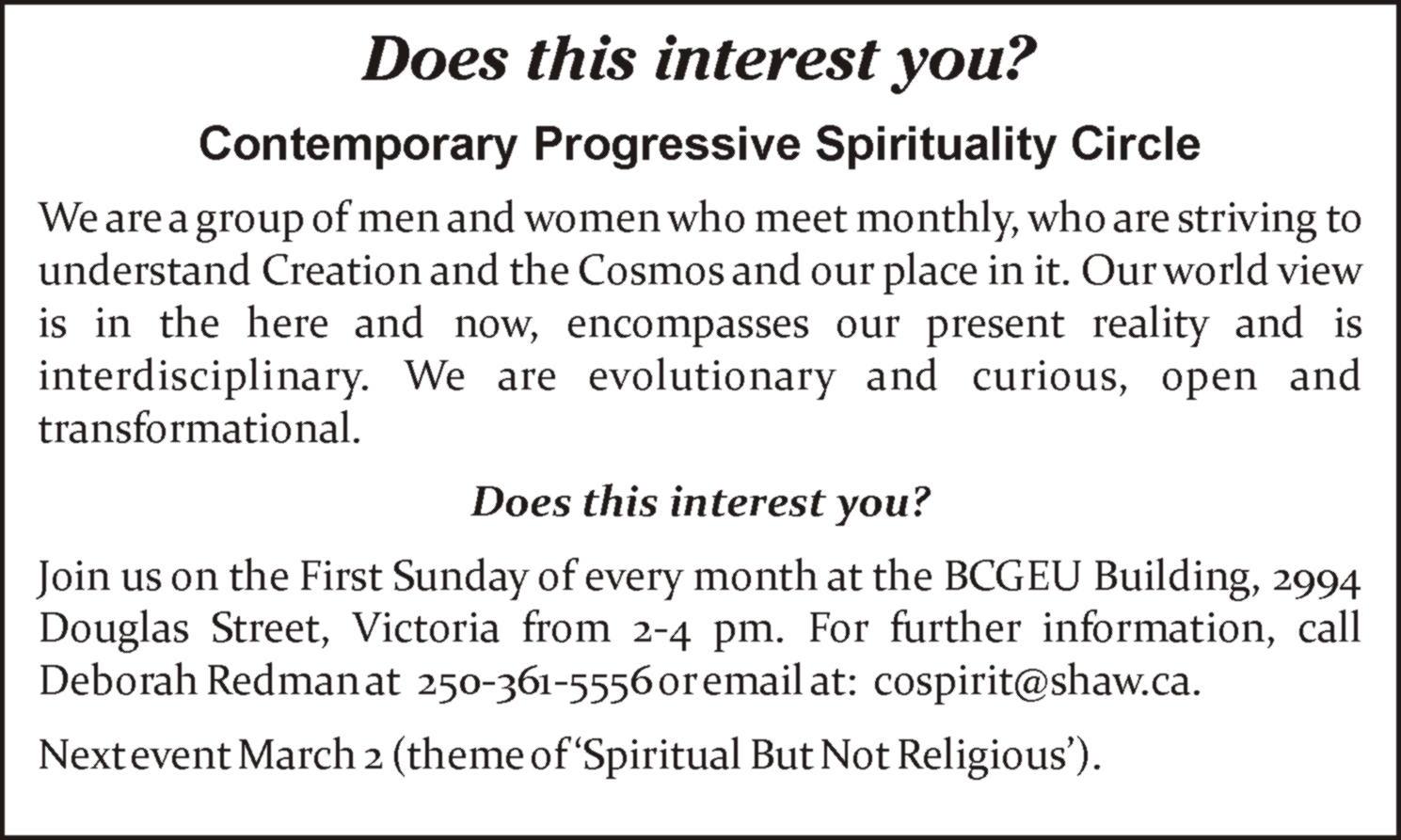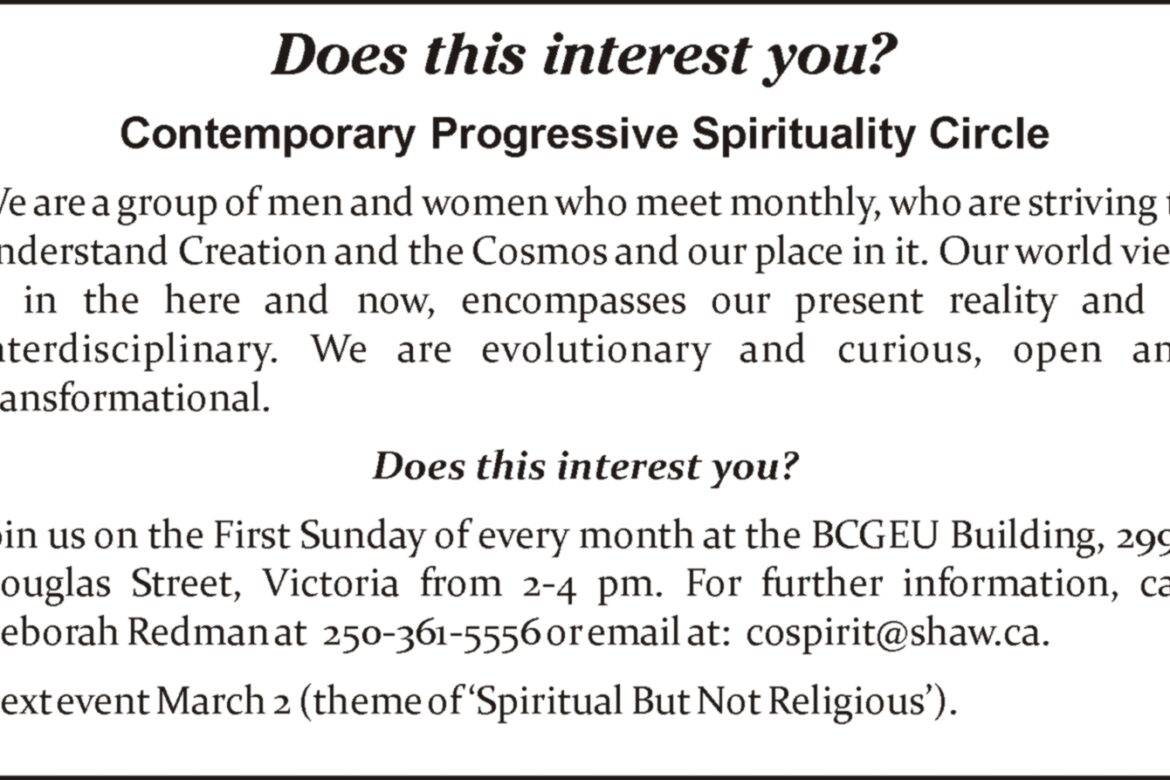‘Spiritual But Not Religious’ – A New Phenomenon
Deborah Redman, Sidney
Volume 28 Issue 1, 2 & 3 | Posted: March 4, 2014

If, at any time, you enter a yoga studio, or a health food store, or an eclectic bookstore or coffee shop and you ask any of the patrons to “describe your religion”, 99 percent of the time, you will hear something like the following. “I don’t have a religion”. “I’m not religious.” “I’m a nature lover”. “I’m a mystic”. “I’m gnostic”. “I’m an eclectic heretic”. “I have a mixed faith”. “I don’t know how to describe it, but I know it when I see it.” It’s subject to change without notice”. “It’s a long story.”
If, at any time, you enter a yoga studio, or a health food store, or an eclectic bookstore or coffee shop and you ask any of the patrons to “describe your religion”, 99 percent of the time, you will hear something like the following. “I don’t have a religion”. “I’m not religious.” “I’m a nature lover”. “I’m a mystic”. “I’m gnostic”. “I’m an eclectic heretic”. “I have a mixed faith”. “I don’t know how to describe it, but I know it when I see it.” It’s subject to change without notice”. “It’s a long story.”
These are the type of responses that Siobhan Chandler, PhD received when she asked this same question to a group of Canadians in 2005. Dr. Chandler’s research focuses on the social significance of the growing phenomenon of the ‘spiritual but not religious’ – now commonly referred to as the SBNRs.
Her research showed that over 50 percent of Canadians would be classified as SBNR. One might assume that SBNRs are not involved in a religion organization whatsoever, however many of them do attend a church, synagogue, or assembly, but are tying their religious tradition or worldview into new pursuits.
There are SBNRs however who don’t attend church or who are not involved in a religious organization. Chandler calls them SDNRs, ‘Spiritual, Definitely Not Religious.’ Their institutional base gravitates to the marketplace.
The SDNRs tend to have an ethic of healthy living and spiritual development, and so that’s why you will find them hanging out in health food stores and buying books on juicing and meditation. Yoga is compatible with the philosophy of seekers and yoga practice is a spiritual practice for many people. These are the places where seekers will find some commonality. Community and networking can develop in lieu of more traditional institutional bodies.
There has been much criticism of this phenomenon of the SBNRs. Critics say that these people are “all over the map”. That it’s a “smorgasbord spirituality” where people pick and choose what appeals to them. There is “no consistency or critical insight”. David Webster has written a book entitled, Dispirited: How Contemporary Spirituality Makes Us Stupid, Selfish and Unhappy. Annoyed with the phrase, “spiritual but not religious”, he argues that modern spirituality is not only unhelpful, but this messy cocktail can make you think non-critically, act non-socially, and be unfilled and unauthentic.
I disagree. There are many patterns that emerge that are consistent with all forms of contemporary spirituality. For instance SBNRs hold to an orientation and belief that God/Divine is inside each one of us and that we are spiritual beings continuously on a spiritual path for wholeness and perfection.
When we mess up, it is because we have lost touch with our Divine Self. SBNRs are drawn to those teachings that help them understand that and they like to link up with those who guide them towards wholeness, in order to be in touch again with the Divine Self or True Self.
Because SBNRs see the divinity in all things, they also believe that all things are interconnected. We are not separate from each other. We are one with creation and the cosmos and with all of humanity. Because SBNRs believe that we are all one and interconnected, it is our social responsibility to ensure the wellbeing of all the earth and all living creatures. And so they are interested in community and social justice. They want the good life to be available to all people. They are particularly interested in the environment and living a healthy life.
SBNRs are not going to go away. In fact it is a fast moving demographic, as are the SDNRs. The reality is that more people in this part of the world can tell you about the different chakras than they can describe the Christian understanding of the Atonement. Many, many more people read their daily horoscope then read the Bible, or Torah or Koran.
The reason why it is growing is that there is such compatibility between its central tenet (Self is divine) and individualism that is at the heart of North American culture. This individualism allows for independent forms of religious or spiritual practice, where seekers help themselves toward what practices they want to partake in, and what beliefs they want to adhere to. This allows individuals to find truth and spiritual fulfillment that resonates with them, wherever they may be on their journey.
It’s a bit of a paradox. Although we live in a culture of individualism, self-expression and freedom, there is still a need for community and to feel as if we belong. So the challenge in this time and place, is to honour autonomous, independent spiritual development and yet provide that in community, without the institutional belief systems, or baggage. Is it even possible?
It’s certainly worth trying. This is not a fringe phenomenon. The SBNRs are growing steadily and they certain ly will not be disappearing. While not ignoring the richness and value of various faith traditions and practices, what would it mean for us to be living in a society that describes itself just as “Spiritual”, rather than “Christian”, or “Jewish”, or “Muslim”, or even “Atheist”? I’m more than willing to find that out.
ly will not be disappearing. While not ignoring the richness and value of various faith traditions and practices, what would it mean for us to be living in a society that describes itself just as “Spiritual”, rather than “Christian”, or “Jewish”, or “Muslim”, or even “Atheist”? I’m more than willing to find that out.
Deborah Redman, Sidney

